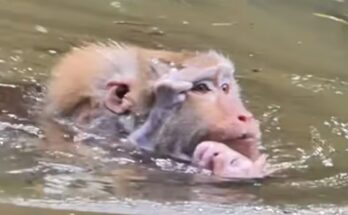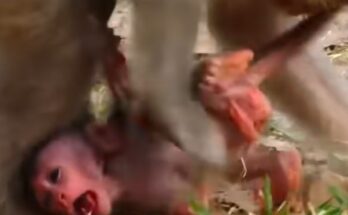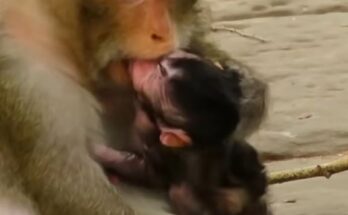In the animal kingdom, maternal care is often seen as a crucial factor in the survival and well-being of offspring. Most primates, including monkeys, exhibit strong maternal instincts, with mothers nurturing, grooming, and nursing their young with great dedication. However, there are cases where a mother may reject her baby, leaving the infant to struggle for survival. One such heartbreaking incident has recently gained attention: a mother monkey refusing to nurse her baby, leaving the helpless infant begging for milk.
Possible Reasons for Maternal Rejection
Maternal rejection in monkeys, though uncommon, is not unheard of. There are several possible explanations for why a mother might refuse to care for her offspring:
- Inexperience or Stress
First-time monkey mothers, particularly young ones, may not fully understand how to care for their newborns. If they have not observed proper maternal behavior from other monkeys, they may struggle to bond with or care for their infant. Additionally, a stressful environment—such as one with predators, competition for food, or human interference—can make a mother feel overwhelmed, leading to neglect. - Health Issues in the Infant
Some monkey mothers reject babies that are weak, sick, or have visible deformities. In the wild, survival is tough, and an unhealthy baby might struggle to keep up with the group. From an evolutionary perspective, a mother may instinctively prioritize her own survival and future reproductive chances over investing energy in a baby that appears unlikely to survive. - Lack of Milk Production
If the mother is unable to produce enough milk due to malnutrition, stress, or health issues, she may abandon the infant. Without sufficient nutrition, she might instinctively refuse to nurse in order to conserve her energy for her own survival. - Social Hierarchy and Group Dynamics
In monkey troops, dominance and social status play a major role in relationships. A low-ranking mother may face aggression from higher-ranking females, affecting her ability to care for her baby. In some cases, other members of the troop may prevent a mother from nursing or push her away from her infant.
The Baby’s Struggle for Survival
A rejected monkey baby faces significant challenges. Without its mother’s milk, the infant becomes weak and vulnerable. Baby monkeys rely not only on nutrition but also on their mother’s warmth, protection, and social learning. In some cases, orphaned or neglected baby monkeys may attempt to latch onto other females in the troop, seeking nourishment and care. However, not all females are willing to adopt another monkey’s baby.
In cases where maternal rejection is observed in wildlife reserves, zoos, or rescue centers, human caregivers sometimes intervene. They may hand-feed the baby, provide warmth, and later attempt to reintegrate it with the mother or the troop. Some rejected monkey babies, if lucky, may find an adoptive mother within the group who takes them in.
Conclusion
While the sight of a baby monkey begging for milk from an unresponsive mother is heartbreaking, it is a natural phenomenon that occurs for various reasons. Understanding these behaviors can help researchers, conservationists, and caretakers provide better solutions to ensure the survival of vulnerable infants. Whether through intervention or by allowing natural selection to take its course, every case offers valuable insight into the complex social structures and instincts of primates.


